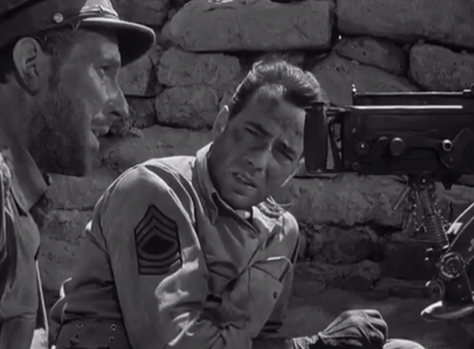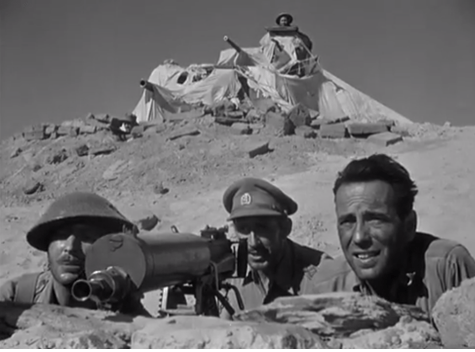
The opening crawl of Zoltan Korda’s Sahara sets the scene, though contemporary audiences were probably already well aware of current events. This war film details the exploits of members of the Armored Corps of the Army Ground Forces. In June 1942 an American detachment joined British forces in North Africa to aid against the troops of Field Marshall Erwin Rommel.
We meet three of our heroes in the heat of battle. Their tank is stalling, mortars are bursting all around them, and they are the only contingent left from their company. With the finesse of a man whispering sweet nothings to a lover, Master Sergeant Joe Gunn (Humphrey Bogart) coaxes their tank Lulu Belle into operation.
His meager crew of Doyle (Dan Duryea) and Waco (Bruce Bennet) are grateful, if not slightly incredulous. However, they’ve learned to trust his shrewdness under fire. As becomes a habit, they make a bet on the outcome, and one of them always comes out of the jam a little bit richer. It’s this manner of gallows humor that allows them to cope with these high stake scenarios.
Before losing radio contact, they were ordered to head south, and they follow through on their orders, wind their tank coalition back from whence they came. However, this story, although it boasts an eventual objective, is really about the arid road to get there. Because out in the bleak sands of the Sahara they find themselves gathering up the dregs of other units, left all but obliterated by enemy stukas.
One can almost hear Bogart explaining how he came to the Sahara for the waters. He was misinformed, of course, but then that’s a different film altogether. In this picture, it’s all about camaraderie. A typically hardboiled Bogey takes the lead with his usual tenacity only after the British officer (Richard Nugent) of more propriety defers to his command.
He knows full-well they must enlist total discipline if they are ever to survive the perils set before them. The first order of business is rationing water against the cries of indignation from his subordinates and yet the rest of the British crew begrudgingly fall in, including the token “Frenchy” (Louis T. Mercier), who is resolved to do whatever it takes.

The storyline systematically introduces new characters into the sand-swept drama, and they are not just new stimuli. They feel like living, breathing characters to tease out another facet of the world conflict. The first is a Sudanese soldier (Rex Ingram) toting a groveling Italian prisoner (J. Carroll Naish). In a plea to be taken along, he speaks of his wife and child and the relatives he has working in a steel factory in Pittsburgh.
The film looks destined to take its darkest turn when Bogart is intent on leaving the enemy soldier behind — they need to conserve as much food and water as possible — but he relents because in Hollywood the allies don’t do such things; even Bogart briefly sheds his steely surface layer.
The Nazis, on the other hand, are another matter. A solitary German fighter pilot (Kurt Kreuger) looks to wipe out their faction with several sweeps overhead, strafing them with all he’s got. Ultimately, he’s shot down and taken prisoner. Of course, his Aryan philosophy means he doesn’t want to be searched by an inferior race.
Admittedly, it feels like a slightly ironic footnote. Major Tambul gets vouched for by his American ally and yet this country wasn’t exactly the pinnacle of racial equity either.
Later, the captured German turns his attention to the entire company, sneering at the ragtag assortment of soldiers they’ve gathered together. They’ll never outlast the German war machine. They’re too disparate. One is reminded of a similar tactic used by Sam Fuller in The Steel Helmet to highlight how the enemy (in that case, a North Korean) looks to play mental war games.
As a side note, it always fascinates me when you have seemingly native German speakers in these old WWII movies. Obviously, this never happened with Japanese (enter Richard Loo) and rarely with Italians. But with Germans and other Eastern Europeans, it was a different case because of the scourge of Hitler.
Kurt Kreuger, as well as John Wengraff, are a couple actors to add to this very unique category. In some ways, although they no doubt detested playing the despicable, the very fact that they are so diametrically opposed to the people they were portraying is another level of cutting derision.
In a subsequent desert storm, the company seeks desperately for any kind of shelter. It proves rather fortuitous leading them to water, which they must painstakingly extract from a trickling well, deep in the ground. It’s a vital resource, and the Nazis are in need of it too. They are the lumbering beast who is rapidly approaching — desperate for resources.
Now time is of the essence, but water is life so they wait to fill up their reservoirs. What this interim period does is give the Allies time to care for their equipment, but, practically, it also allows us to get to know each man better. Their religious beliefs, their wives, the places they call home.
I couldn’t help thinking of Tom Hanks in Saving Private Ryan when one soldier asks where their commander is from. Gunn is far less accommodating. He simply says “no place, just the army.” In each case, their responses more than fit their respective backgrounds, and it gives them a moment to assert themselves as being all the more human.
When a German recon unit arrives, they are dealt with soundly and tempted with water. It’s all a ploy to draw the enemy in for as long as possible. Waco volunteers to try and go off for reinforcements to aid against the impending Nazis. For now, all they’ve got are the men in front of them.
Generally, the film revels in pithy dialogue, but there are a few instances it can’t help but wave the flag for a moment or two. For instance, when Bogart gets candid it feels like a “hill of beans” speech in Casablanca. It could be corny and sentimental but Bogey somehow makes his speech, spattered with references to Dunkirk, Bataan, Moscow, and China, feel like a stirring call to arms.

However, they still have a treacherous enemy in their midst, bent on sounding the alarm for his countrymen — by any means necessary. Because, of course, the outpost is now drained of its liquid gold. They’re being played for suckers. This is when the Italian, Giuseppe, gets his moment to shine — his own speech denouncing Hitler and the German way. It’s a stirring stance even if it’s purpose is blatantly obvious.
With waves of German soldiers looking to take their post, the Allies rally to hold them up for a while, taking as many men down with them as possible. They fight the hundreds with their lusty force of less than ten. It’s a David versus Goliath-like struggle.
The tension doesn’t abate as Sergeant Major Tambul chases down the fleeing Nazi pilot in no man’s land. He tracks him down in a scene imbued with so much real emotion that Ingram got so caught up in the moment, he nearly choked Kurt Kreuger to death.
The strafing is heavy on both sides. Waves upon waves of Germans are brushed back, even as the defenders are knocked off one by one. American fortitude and teamwork involving everyone rules the day as want of water finally cripples the opposition. The drama cools off even as we must take account of the losses. Sacrifices are warranted on all sides.
Sahara is a rousing war film for the very fact it builds a whole world out of California’s Anza-Borrego Desert further fortified by a compelling scenario that’s easy to relate to. What it forfeits in terms of all-out authenticity, it more than makes up for with character. All of a sudden, World War II becomes personal and spearheaded by Bogart — a perfect embodiment of American grit and determination — we soon get behind every heroic action. It’s home front propaganda, nevertheless, functioning, at its best, as unadulterated entertainment.
4/5 Stars
